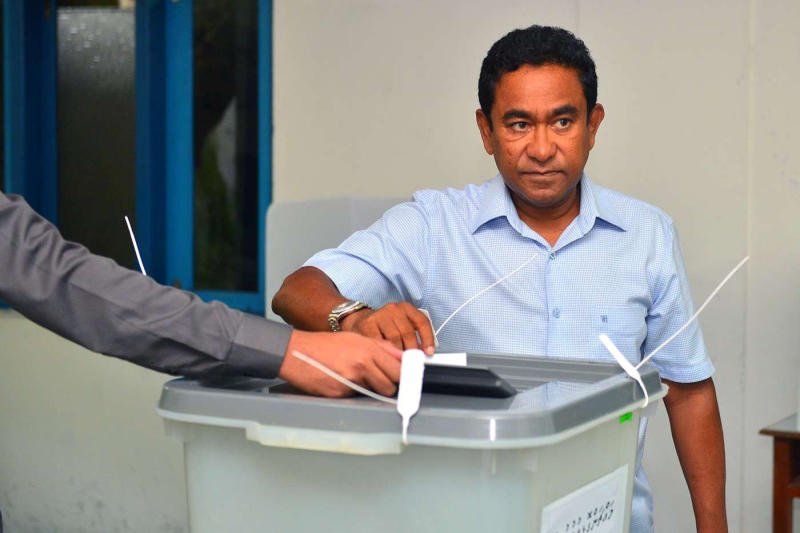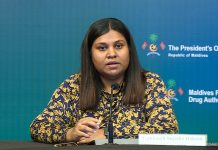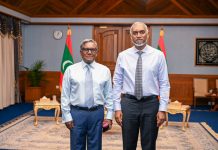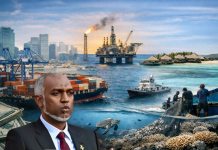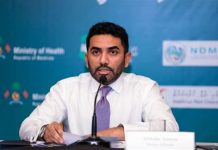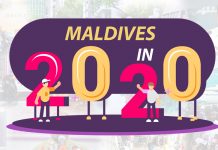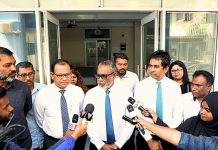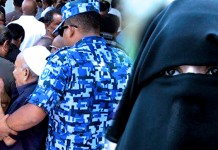The population of the Maldives breathed a collective sigh of relief this week as their Supreme Court rejected the ruling party’s attempts to invalidate last month’s presidential election. Despite the comprehensive defeat of President Abdulla Yameen Abdul Gayoom in a trouble-free poll on 23 September 2018, and an almost-gracious concession the following morning, the reeling regime had quickly reverted to authoritarianism over the next few weeks, threatening to reject the result. Perhaps the victory of the sole opposition candidate, Ibrahim ‘Ibu’ Mohamed Solih, had been a mirage?
A handsome win for the candidate of the Maldives United Opposition (MUO), a coalition squeezed into existence by President Yameen’s galloping autocracy, was likely in a clean ballot. But what was unexpected was a free and fair vote, given the steps that had been taken to skew the playing field. President Yameen’s five-year term had left the young democracy deeply unbalanced: give the country its first ever bridge, take away all the opposition leaders and put them in jail; give a handful of new airports, take away basic constitutional rights; give reclaimed land, new apartments, etc, but take USD 80 million in the country’s largest ever corruption scandal.
The regime seemed unmoved by repeated international criticism, warnings of targeted sanctions and fears about the election’s credibility Long-overdue reforms of the criminal justice system were kept in abeyance. Two of the country’s best and brightest writers –Yameen Rasheed and Ahmed Rilwan – were cruelly silenced, one killed and another disappeared. When people were finally given a chance to express themselves on 23 September, they made their choice clear. Despite the rampant misuse of state resources, flagrant attempts at mass vote-buying, a desperate waiving of fees owed to the state, and the campaign-trail inaugurations of five years of infrastructure projects, the people decided that President Yameen had taken more than he had given and voted him out.
Almost a quarter of a million voters (89 percent of the 262,135 eligible) queued in the tropical heat outside polling stations on 187 inhabited islands, 35 island resorts and four overseas locations, some for up to eight hours. Most people expected an intervention, an incident – any opportunity to disrupt the process at any moment. But they queued anyway, and in the end, the polls closed peacefully. Polling was extended by three hours and then the results began to trickle in.
The first results to filter through were the smaller ballot boxes placed for resort workers, giving Ibu a promising start with three out of every four votes. While the larger private media outlets eagerly reported the opposition’s strong start, the state media held back, hoping to report the count with some good news for the incumbent. Eventually, they just started counting anyway. By 9pm, Ibu’s tally was hovering steady at just under 60 percent (still 53 percent on state news) and opposition supporters now dared to believe.
For voters in the capital suburb of Hulhumale, Yameen’s iconic China-Maldives friendship bridge was deemed to be worth just 42 percent of their support. The Kulhudhuffushi electorate valued its recently finished airport, and the accompanying devastated mangrove, a little more, giving the incumbent 45 percent. “Thanks for the new link road”, said Laamu atoll, “but no thanks”– a 10 percent advantage for Ibu. For forcing Maamingili’s favourite son, the Jumhooree Party’s Gasim Ibrahim, into exile, the island gave 85 percent of its vote to his coalition partner, Ibu. The trend continued into the night.
By midnight, the result seemed beyond doubt and Ibu emerged to claim his victory before the press. In the end, just two of the twenty atoll divisions (and those, two of the smallest) gave a majority vote to Yameen. His losses in the capital Male, home to one-third of the population, were worse than his overall average, and the final margin of victory was over 38,000 votes. The people’s resounding verdict appeared too big to overturn.
Stunned crowds, finding themselves able to freely assemble in the streets once more, thronged the president-elect. Yellow-flagged motorcycles honked their way around the capital as the Elections Commission (EC) confirmed the provisional results. A 20-foot image of the president was felled, Saddam-style. Yameen himself stood before the cameras of state TV the next morning, defending his record, but nonetheless conceding defeat. India, the EU and the US rushed in from the cold to acknowledge the opposition victory and to urge an orderly transition, while Yameen’s main development partners China and Saudi Arabia caught up a few days later.
What really happened?
But how had this incredible outcome come about? Was it the inevitable outcome of people’s will overriding authoritarian restrictions? Unfortunately, the real explanation is a little less heart-warming, but important to understand for anyone wishing to see Maldivian democracy flourish in its challenging environment. An analysis of the conditions surrounding the election suggest that democracy was temporarily allowed to happen on 23 September, and that the people’s ability to speak and to be heard is still far from guaranteed.
While the true story of what went on behind the scenes of the 2018 election may never make it further than twitter rumours and whispers over coffee, anyone familiar with recent Maldivian politics will know that this was a far closer affair than the numbers suggest. While the electoral arithmetic appears fairly straightforward in hindsight, there were many more figures contributing to the result, as reported here earlier. (previous article). External factors seem to have cancelled one another out on polling day, leaving ‘one person equals one vote’ as the only equation that mattered. But, with so much left to chance, can Maldivian democracy be trusted to clearly reflect the will of the electorate again?
The election was conducted in the absence of a functioning legislature, an independent judicial system, police service, and oversight bodies. Essentially, this was a democratic process taking place in a vacuum, almost completely untethered to any other functioning democratic institutions and the events that followed the EC’s official recognition of the result have only confirmed the precarious nature of the situation.
After the declaration of the provisional results had made anticipated attempts to query the outcome seem all but impossible, fears of one last sting in the tail appeared to be coming true. After grudgingly accepting the results and pledging to continue to serve the country from outside the government, President Yameen’s Progressive Party of Maldives (PPM) changed their mind and began scrambling frantically to discredit the ballot. The party turned on the loyalists they had placed within the EC, using clumsily edited phone recordings of Election Commission officials, along with theories of disappearing ink, in order to fabricate evidence for the courts. While opposition supporters were fretting about documents and funds being removed from the President’s Office, it became clear that the incumbent had little intention of taking his dignity with him. In front of the camera, Yameen defended his moves by asserting that he knew himself to be more popular.
Despite the unsettling noises emanating from his party however, Yameen’s grip on power had begun to slip within hours of his electoral loss. Reports emerged of a letter of concern from the central bank regarding a USD 1.5 million transfer to his personal bank account before the ink on the ballots had even dried, and the courts began releasing political prisoners the very next day. Yameen’s half-brother, Maumoon Abdul Gayoom, who ruled Maldives for 30 years, has had his jail sentence overturned since, and opposition party leader Gasim has been granted bail. Meanwhile former President Nasheed has stated his intention to return at the start of November 2018, regardless of political developments.
Yameen’s own response was the appointment of a new police commissioner in an attempt to steady his ship. But, when the Supreme Court (minus two jailed judges) sided with the increasingly harassed EC to overturn the last year’s expulsion of a dozen opposition MPs, thus potentially stripping the government of a majority in the People’s Majlis, the president must have realised there were few options left. Had he found any support among the oligarchy, President Yameen would not be vacating the President’s Office at all, and it appears that only the arbitrary decisions of a familiar coterie of judges, soldiers and businessmen, have prevented this election from being anulled just as the first round was in 2013.
So, it seems evident that to bask too long in last month’s democratic victory, to imagine that the country’s problems are now over, and that the system works, is to risk repeating the mistakes of the past. Few know this better that former President Mohamed Nasheed, whose own shock victory in 2008 was prematurely cut short in 2012 by a backlash of conspiratorial conservatives. The recent result certainly lends weight to his optimistic assertion that “democracy is an inevitability”; perhaps in the long-term, but he was quick to acknowledge that this win probably owed a great deal to international pressure.
Troubled transition
In a perfect world, President-elect Ibu would be spending his transition period fine-tuning policies concerning climate change adaptation, population consolidation, de-radicalisation programmes, economic diversification to ease the dependence on tourism, a rebalancing of foreign relations, affordable transport throughout the 1200 dispersed islands, and accessible medical services. But his term is far more likely to founder on issues related to unity within his party and coalition, transitional justice, constitutional repair, and the post-Yameen clean-up.
The tricky issue of transitional justice, as opposed to classical political spoil-sharing, will require balancing the need to heal a small and divided community, and to break with the country’s unsustainable record of political vengeance, with the equally important democratic need for accountability and justice. Former President Nasheed’s more forgiving approach to the defeated dictator Maumoon and others in 2008 eventually came back to haunt him. But alternative analyses of the Maldives’ first truncated democratic presidency might suggest, conversely, that tackling the country’s powerful economic and political figures head-on can be equally disastrous.
As head of a group of parties, Ibu must first conclude negotiations with his allies to avoid running out of steam before next year’s parliamentary elections, which will be crucial to push through vital legislative reforms. This will be easier said than done. While Ibu’s MDP has pressed consistently for a liberal democracy since its establishment in 2005, an ‘enemy of my enemy’ ideology is still the norm among most Maldivian politicians (the previously unthinkable union of the former nemeses Nasheed and Maumoon is a prime example). Former President Nasheed has repeatedly called for more official recognition of party coalitions via a full parliamentary system, but root and branch constitutional change appears not to have widespread support across the MUO. The coalition’s break-up is likely a matter of ‘if’ rather than ‘when’ given the leaders’ past records and the early signals in the days following the election .
Regardless of recent injustices, personal grudges are hard to keep on tiny islands, memories are notoriously short, and middle ground is non-existent. Any disgruntled MUO supporters will have little choice but to walk straight into the open arms of the PPM and start up Male’s political merry-go-round for another spin. Despite losing the election, it must be recognised that the PPM, by hook or by crook, did take over 40 percent of the vote, based almost entirely on Yameen’s ability to force through development projects in any way possible; an issue which currently links to China’s support for the Yameen government.
While international observers are fascinated by the geopolitical implication of the election, the reality for Ibu is that the PPM’s support is likely to have grown by next Majlis elections (usually held around March) as the deluge of projects and Chinese finance inevitably recedes. The true exposure to Chinese debt – thought by some to be as high as USD 1.5 billion, or 40 percent of GDP – may not be known until after the transition. The influential Nasheed has certainly talked tough on China’s alleged predatory lending, hinting at renegotiation of current deals, but while the superpower continues to send more tourists to the Maldives than any other country, the economic and political risks (well documented in neighbouring Sri Lanka) are considerable if Ibu doesn’t exercise caution.
Ostensibly, it is the opinion of the new president that matters most on these issues, but the coalition has many other heavyweights eager to get out of jail/exile and back into action. The octogenarian Maumoon is highly unlikely to seek a return to frontline politics, but loyalists for Nasheed and Gasim, both legally excluded from last week’s ballot (despite Nasheed winning his party’s primary, unopposed), will rally around them at the first sign of coalition discord. The overturning of Nasheed’s ‘terrorism’ conviction, whether it be through retrial or presidential pardon, will be a formality, as will be the case for many others who have been convicted under questionable circumstances. How will the coalition manage a glut of paroled patriarchs?
Some of these leaders, as well as nominal coalition allies like former Vice President Ahmed Adeeb, still have many questions to answer regarding their role in recent democratic reversals. In the Maldives’ traditional zero-sum political game, these individuals would have been forgiven and welcomed back into the fold after a brief period of exile. But this time the stakes are higher; millions in public funds were stolen, and lives were lost. Can democratic institutions support principle over pragmatism and secure a new democratic culture? How the new government handles the investigations into the disappearance of journalist Ahmed Rilwan, and the murders of MP Dr Afrasheem Ali and the blogger Yameen Rasheed will act as an early barometer of its democratic credentials and intentions. The loss of these hugely popular figures, the incompetent investigations, and the botched trials represented the nadir of the recent slide towards a repressive and violent autocracy. As well as providing renewed impetus for desperately needed police and judicial reform, a thorough investigation at the executive level can provide long overdue justice to families as well as exposing the shadowy cabal of radicalised gangsters that continue to pose an immediate danger to public safety.
The vote on 23 September was a huge step forward in the Maldives’ long-term transition to democracy, but the past decade has shown that dramatic advances can suffer equally rapid reversals. The next crucial moves can be taken only if the complicated background of events is this time fully understood – by citizens, by politicians, and by international partners alike. The hopes and dreams of the archipelago’s voters have been made clear once more, can their new leaders prevent another rude awakening?
News Source– Celebration of the Maldives’ democratic gains must be tempered with realism.

